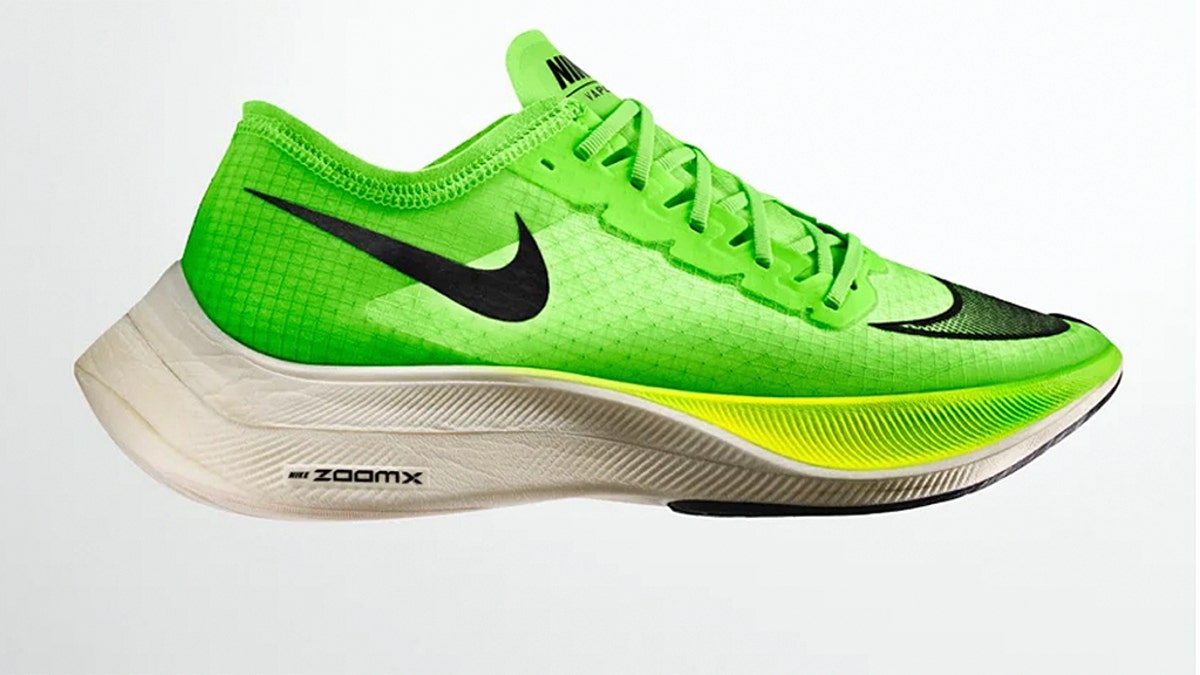Fox News Flash top headlines for Nov. 2
Fox News Flash top headlines for Nov. 2 are here. Check out what's clicking on Foxnews.com
A debate is heating up in running circles on whether a specific type of shoe can give runners a competitive advantage ahead of Sunday's New York City Marathon.
The Nike Vaporfly shoe is becoming increasingly controversial after Eliud Kipchoge's sub-two-hour marathon in Vienna on Oct. 12, and Brigid Kosgei's impressive record-setting run at the Chicago Marathon last month.
Both wore the high-tech sneaker, according to Reuters.

Eliud Kipchoge runs on his way to break the historic two-hour barrier for a marathon in Vienna, Saturday, Oct. 12, 2019. Eliud Kipchoge has become the first athlete to run a marathon in less than two hours while wearing the Nike Vaporfly shoes. (Jed Leicester/The INEOS 1:59 Challenge via AP)
OLYMPIC GOLD MEDALIST KIKKAN RANDALL OPENS UP ABOUT HER CANCER BATTLE, RUNNING NYC MARATHON
In 2016, the top three contenders in the men's marathon at the Rio Olympics were all wearing a prototype version of the Nike Vaporfly that's made with a unique fusion of Pebax foam with a curved carbon fiber plate, according to Outside.
Shalane Flanagan won the New York Marathon in 2017 and told Reuters that runners should "always question what's going on" in their world, but she believes they shouldn't take away from individual performances.
“You could give the pair of shoes to Joe Shmo off the street – they can’t go run what Eliud ran or Brigid Kosgei,” said Flanagan.

The Nike Vaporfly shoe has sparked debate over whether it gives runners an unfair competitive advantage (NIKE)
The International Association of Athletics Federations (IAAF) chimed in on the debate by establishing a group months before Kipchoge's victory to find whether the shoes did, in fact, give competitors an unfair advantage.
The group is expected to report their findings before the end of the year, according to the outlet.
“The challenge is striking a balance between spurring development of ‘new technologies’ while preserving ‘the fundamental characteristics of the sport’,” the association said in a statement, according to Reuters.
In response to the IAAF, Nike says they "respect" the association and "the spirit of their rules."
“The shoe that Brigid wore in Chicago is the Nike ZoomX Vaporfly NEXT%. In Vienna, Eliud wore a future version of the Nike Vaporfly that is currently unreleased,” a Nike spokesperson said, according to Reuters. “However, a shoe is only one factor in a race, and Eliud’s incredible run should be acknowledged.”
NYPD OFFICER'S WIDOW TO RUN NYC MARATHON TO RAISE MONEY FOR FAMILIES OF FALLEN HEROES
The shoes, which cost roughly $250, are now being used by recreational marathoners, according to the Wall Street Journal.
The sneakers are made with a carbon fiber plate, which biomechanics experts told the outlet mimics the spring achieved from the prosthetics blades of amputee runners, which helps them use less energy to run the same speed.

2019 Kenya's Brigid Kosgei runs to finish to win the women's marathon setting a new world record while using the Nike Vaporfly shoes. (Reuters)
Nike is reportedly the first manufacturer to use that technology in a shoe.
Meb Keflezighi won the New York City Marathon a decade ago and still believes credit should be given to the human body, not a product.
“You’ve got to have the lungs, you’ve got to have put in the work and all that,” Keflezighi said, according to Reuters. “If there’s a lot of aid at the end I’m pretty sure it will make a difference.”
Even so, a new piece of technology may give competitors the edge they need to pull ahead of the pack.
CLICK HERE TO GET THE FOX NEWS APP
“It’s going to become — well, it is — an arms race, and it should be a foot race,” 2018 Boston Marathon winner Des Linden told the outlet. “We should find out who [is] the best athlete and who can cover 26.2 [miles] better than the other person, not who has the newest, greatest technology.”









































